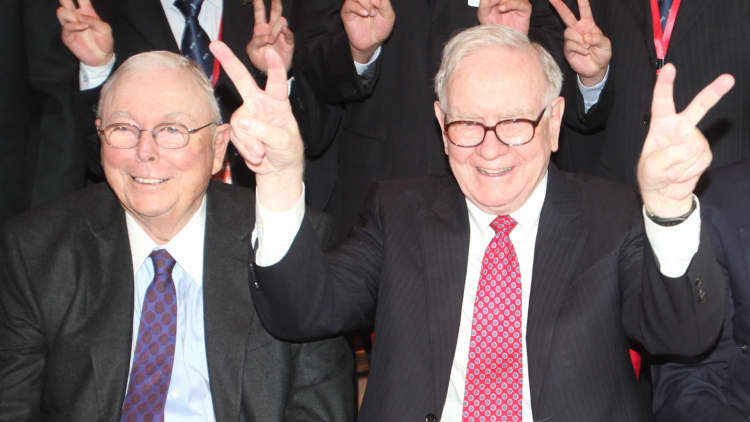When Danielle Town found herself burnt out and even starting to get sick from her work as a corporate attorney, she knew she didn't want to keep laboring at the same breakneck pace for much longer. So she started brainstorming ways to retire faster.
"I started to think, 'What else can I do to support myself without being dependent on my salary?'" Town tells CNBC Make It.
Although she was reluctant to turn to the stock market, she eventually called up her dad, an investor who had written two finance books, to walk her through the basics of investing. Town spent the next year developing a weekly practice and learning the basics of 'value investing,' a system Warren Buffett and Charlie Munger employ in their own lives.
Value investing means you "buy a wonderful company when it is a bargain and only when you are certain that it will be worth more 10 years from now than it is today," Town writes in her new book, "Invested: How Warren Buffett and Charlie Munger Taught Me to Master My Mind, My Emotions, and My Money (with a Little Help from My Dad)."
She continues: "Be so confident that you now own a great company that — even if the stock prices goes down — you don't worry and you stay with it until it goes back up, and, ideally, you never sell."
To follow this advice, Town decided she needed to be dedicated to researching and tracking companies she believes in, rather than putting her money into index funds or a target date fund and calling it a day.
In addition to following Buffett's No. 1 rule, "Don't lose money," Town also studied Charlie Munger's four guidelines for picking winning companies. Here's how she breaks them down:
1. It must be a business you are capable of understanding
First and foremost, choose companies that make sense to you. "This is an extraordinary principle because it doesn't say, 'Understand it right now,' it says, 'Once you put some time into it once you put some research and some practice into it, I know that I can figure this company out,'" Town says.
In fact, once you start looking around, you'll realize that you're actually an expert on a multitude of businesses and products. Try looking around your house, Town suggests. "There are a lot of companies we encounter every single day in our normal lives and we already have opinions about those companies and what kind of products they make," she says.
Anything from the brand that makes your toilet paper to the place you buy your groceries to the most-used app on your phone could be a potential investment.

2. It must be a business with a durable competitive advantage
"In industry parlance, this is called a 'moat,' like the moat around a castle," Town says.
A company's moat is what sets it apart from its competition. "If a business has a good moat, it's going to be hard for competitors to breach the moat and take the castle," Town writes in her book. "Not impossible, but difficult. So difficult that they won't try. So difficult that if they had all the money it would cost to buy the whole company, they still couldn't compete with it."
Examples of moats include a strong brand, such as Coca-Cola or Kleenex; proprietary secrets, such as the drug patents Pfizer and Merck hold; or when it's prohibitively difficult to switch to another, similar company, the way it would be for a long-time Apple user to convert their phone, laptop, tablet and everything else to non-Apple products.

3. Ideally, the business's management has integrity and talent
Munger and "Warren Buffett have both talked a lot about how they want to make sure they have a company that can withstand human error, because eventually someone's going to come along and try to screw this company up, and you want a company that can handle that and get back on its feet within a few years," Town says.
The first company Town invested in was Whole Foods, because she respected its CEO and loved its emphasis on conscious capitalism.
However, it's important to remember that this isn't completely necessary, because no company is immune to human error. "We'd like to have good management but we are aware that sometimes people screw up," Town says.

4. It must be a business you can buy for a price that makes sense
Time your purchase well to make sure that you're getting a good deal. Although this principle might seem the most obvious, Munger lists it fourth for a reason.
"First of all, you find the company and that's wonderful, then you look at the price," Town explains. "And only when the price is right do you then buy — with a margin of safety — so that in case [you're] wrong, there's still a margin of safety on that so that it can go down it can go up and will still make money."
Don't miss:
- A 36-year-old who learned to invest like Warren Buffett explains how saving can actually cost you money
- Here's exactly what an index fund is—and why it's Warren Buffett's favorite way to invest
- A 36-year-old who learned to invest like Warren Buffett explains Buffett's No. 1 rule
Like this story? Like CNBC Make It on Facebook!




